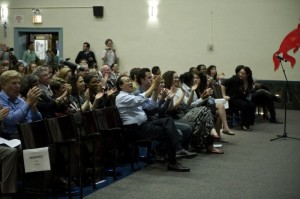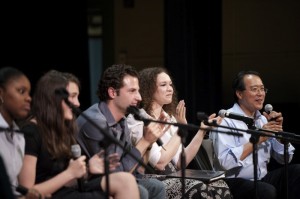
Yo-Yo Ma and audience applauds the ChiArts chorale after their short performance before the discussion. Credit: Chicago Symphony Orchestra - Brian Kersey, photographer
On Tuesday May 11th in the auditorium at the Chicago High School for Arts (ChiArts), Yo-Yo Ma led a compelling conversation with a panel of five young musicians: Maggie Cerjan, Elizabeth Gray, Manuel Piñera, Natalie Nedvetsky, and Ashanti Gayden, who embody the core values of Chicago Symphony Orchestra (CSO) Citizen Musicianship. This symposium was one of the many events of the 2011 Chicago Youth in Music Festival which ended on May 16th.
In a previous article on String Visions, Colin Cronin wrote about the power of music to make a difference beyond the concert hall and the practice room. Citizen musicianship is a powerful testament to that vision.
The Citizen Musician Initiative supports musicians who strive to “use music to create moments of community and share their experiences and enthusiasm with others.” Citizen musicians take their music out into the community with the goal of bettering the lives of the people around them. Ma’s panel members exemplify this notion. They have performed in inner-city elementary schools, worked with incarcerated youths, ran benefit concerts to support the Central Asian Institute and studied the El Sistema music education model. Elizabeth Gray, discussing her work at the Illinois Youth Center eloquently summarized the goal of the citizen musician: ” We let others use music as their voice… we share this voice, and in this, they have a way of release and expressing themselves.”
Ma and the others shared their ideas with incredible passion, precisely the passion that is necessary for visionaries to make a difference in the classical music world. As musicians we instinctively know that our art is powerful, but for some reason we have never truly harnessed this power. Instead, we cling to the identity of the classical musician as the protector of an important and dying art form. In this process we have alienated ourselves from the rest of our society. This symposium highlighted classical music’s role in social justice in a way that forces musicians to reconsider the power of their art and reimagine their own roles as active members in society. With the same contagious passion and joy that one feels when walking into the concert hall of a one of his cello performances, Yo-Yo Ma shared his belief that music is capable of doing more. He said:
Art and music is a way of achieving a sense of justice for the whole… You had to tell a story, you had to make it happen, because it’s a way of creating a complete picture of what is possible. It happens in nature and it is through music that humans also find a way to do that.
Yo-Yo is leading a new generation of classical musicians who have decided they can do more with their music, a generation of musicians who have decided to use their passion for classical music as a tool to reform social identities and create new types of communities. In the work of Yo-Yo Ma and the citizen musicians I hear the echoes of Pablo Casals, “Perhaps it is music that will save the world.”
Panel members at Tuesday’s Symposium included:
- Violinist MAGGIE CERJAN, member of the Civic Orchestra of Chicago, MusiCorps and the Yours Project
- Soprano ELIZABETH GRAY, member of the Chicago Symphony Chorus, works with incarcerated youth at the Illinois Youth Center
- MANUEL PIÑERA, member of the Carlos Chávez Youth Orchestra, studying El Sistema music education model
- NATALIE NEDVETSKY, piano student, organized a fundraising concert for the Central Asian Institute
- ASHANTI GAYDEN, ChiArts student and clarinetist
Yo-Yo Ma: “When we got here, we passed a portrait in the hall, the one where the young woman extends her hand, and actually the frame only goes so far, but actually because her hand extends further the frame is extended, and that’s the type of art we love, because…the value of…it is that it extends our imagination. It exercises it and pushes it a little bit.”
Elizabeth: “So we worked together with young teenage women who are at the Illinois Youth Center in Warrensville. And our goal is to have an positive effect with music, and particular our craft, which is singing.
Elizabeth: “We let them use music as their voice. So we share this voice, and we craft songs based on their lives….In this, they have a way of release and expressing themselves.”
Elizabeth: “It has been an honor to do this work, because giving back and helping others really makes you a better artist.”
Maggie: “We provide access for those people not fortunate enough to have music programs in their schools and communities. We seek to inspire people and educate them about classical music.”
Yo-Yo Ma: “It’s values based…Guidance, Integrity, Creativity, Humility, Perseverance. I think these are all fundamental parts of what creates a citizen. For me, one of the things that I have heard about music is that music is one of these hard things to…you can’t touch it and yet, you feel it. It’s hard to measure it, but it’s important. And, as a student, I was always taught that when you play music, it’s really not about it, it’s about something that bigger than you. And I think all my life I have been trying to hold on to this….I think part of the connection between music and citizenship is that as a citizen, the biggest thing is your country….
Natalie: “What really inspired me raise money for the central Asian institute, is this huge obligation to use my music not just for myself, but to use music to connect different cultures and making the world a better place and connect people all over the world.”
Yo-Yo Ma: “The question, what makes music human…what inspires you, the question, what do you do when you are in doubt? We need to remember, if not for music, we would not be here together today to inspire each other. And I think the very obvious and simple thing to say is, we look around us and we see the need, that’s what makes us human. Art and music is a way of achieving a sense of justice for the whole. You had to tell a story, you had to make it happen, because it’s a way of creating a complete picture of what is possible. It happens in nature and it is through music that humans find a way to do that.”















No comments yet.